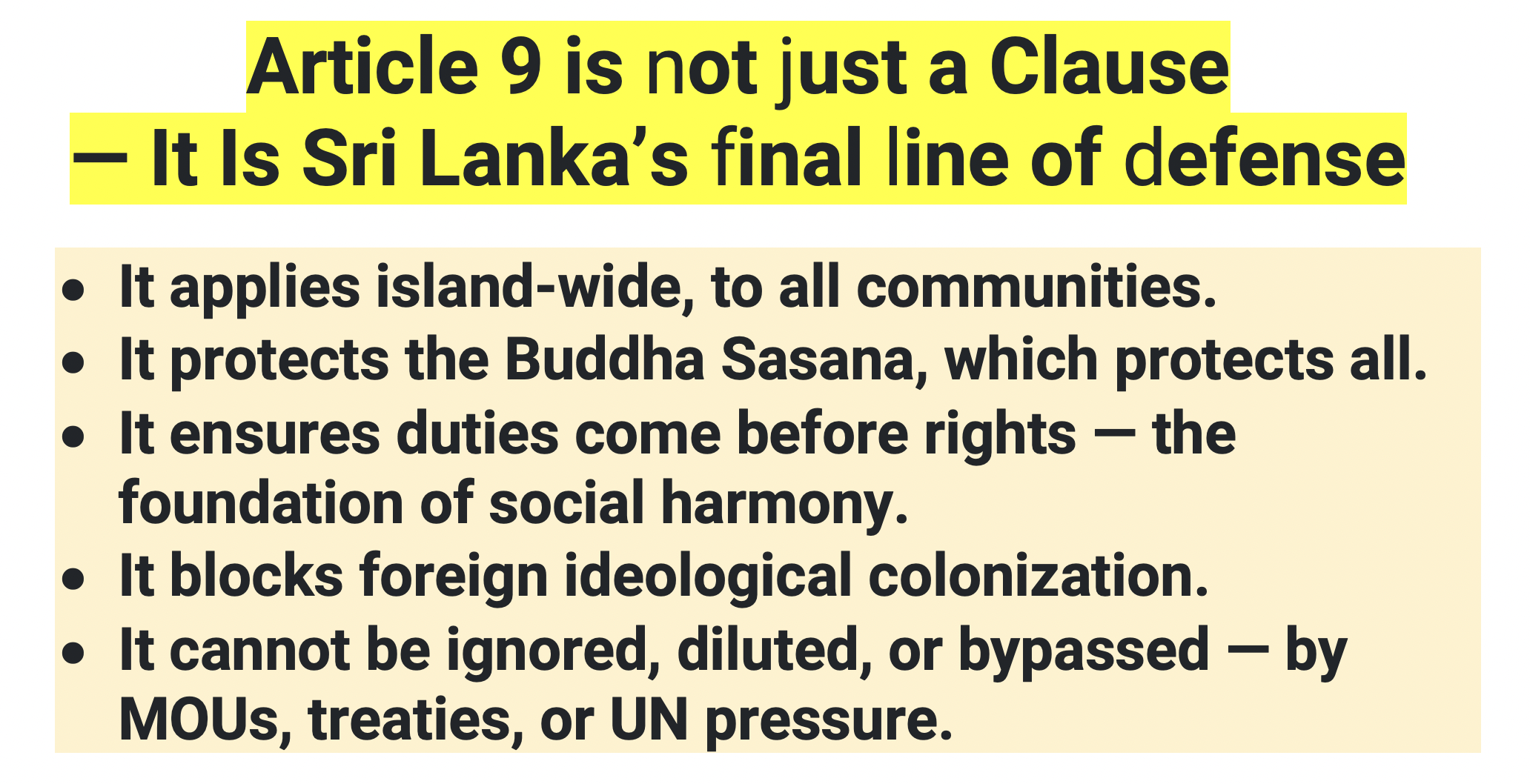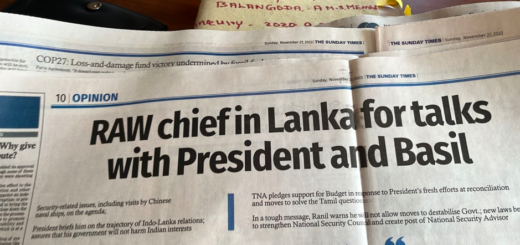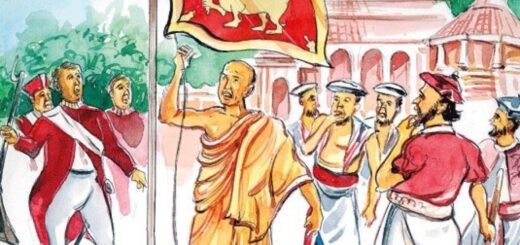Why Sri Lanka must reject all foreign agreements that violate Article 9 and Buddhist Jurisprudence”

What can never be overlooked is the fact that Buddhist jurisprudence governed Sri Lanka for over 2600 years & formed the moral, legal & cultural foundation of the society & civilization. This was recognized & acknowledged in clause 5 of the 1815 Kandyan Convention guaranteeing continuation of Buddhism & its traditions. That historical continuity is enshrined in Article 9 of Sri Lanka’s 1978 Constitution mandating the State to give foremost place to Buddhism & protect & foster the Buddha Sasana. This means, no Sri Lankan government, elected or unelected has legal or moral authority to sign any international agreement, treaty, MOU or accept non-binding UN recommendations that compromise Buddhist jurisprudence or its principles. The power of Article 9 & the Buddha Sasana is unconditional & limitless because it reflects the unbroken will of a 2,600-year-old civilization that entrusted the State with its spiritual guardianship.
The moment Article 9 is removed or weakened, the Buddha Sasana loses its legal protection, Buddhist clery, Dhamma education, Vinaya-based guidance is erased & loses significance, foreign ideologies gain entry & legitimize & roll out all forms of immoral subversions on individuals & society under the banner of “human rights” & there is no defense line to protect the nation morally, culturally or legally as psychological colonization would end up destroying an entire nation.
This is why every foreign proposal / recommendation / MOUs etc has to be viewed with caution & explore what their ultimate objectives are & how far these conflict with Article 9 which covers the entire island & not just Sinhala Buddhists but all of the citizens of Sri Lanka including their faiths. This aspect is important for all to understand & acknowledge.
Every foreign proposal must be scrutinized through the lens of Article 9 (a National shield not a sectarian clause)
The belief that Article 9 benefits only Sinhala Buddhists is false.
Article 9 safeguards the Buddha Sasana as a moral backbone of Sri Lanka’s civilizational identity. This indirectly upholds social order, public morality & inter-religious coexistence. Article 9 creates an ethnical environment where all faiths can thrive in peace. Article 9 protects cultural continuity, discipline, family structures & child protection of all. Article 9 ensure foreign ideologies that threaten moral decay & societal breakdowns are filtered out through a constitutional lens rooted in spiritual wisdom. Article 9 serves every citizen because it preserves a shared moral ecosystem.
Having established that Article 9 & Buddha Sasana represents not only the heritage of the Sinhala Buddhist majority but also the moral, ethical, legal & cultural foundation of the entire island, while serving all citizens of Sri Lanka irrespective of faith, ethnicity of background without prejudice, Article 9 essentially serves as a constitutional shield to ensure foreign ideologies, moral corruptions, rights without duties do not erode the spiritual & societal well-being of the nation.
The protective power & protective nature of Article 9 & the Buddha Sasana is enshrined in the Constitution & has to be formally recognized & respected by every arm of the State – the Executive President, the Judiciary, Public Institutions & Civil Society as being the final legal & moral safeguard on Sri Lanka’s national identity & future stability.
Thus, every MOU, treaty, foreign recommendation must be examined cautiously.
Sri Lanka has every right to adopt a constitutional filter before endorsing them. It must be used as a safeguard.
Within the lens of Article 9 & Buddha Sasana, Sri Lanka’s custodians (President, Parliament, Public Sector & Judiciary) must determine
- Real objective of the foreign proposals
- Whether it undermines the natural family, morality, education, or constitutionally accepted gender
- Whether it promotes rights at the cost of duties contradicting Buddhist & local values
- When it directly displaces religious teachings in favor of secular ideologies.
If “yes” – the state has a constitutional duty under Article 9 to reject them.
Are all State Institutions & Citizens aware that Article 9
- Applies across the entire territory of Sri Lanka – every district, every province without exception.
- Offers moral protection to all faiths & communities not just Sinhala Buddhists by preserving the integrity of our national ethos & foundational heritage
- Does not permit fragmentation or compromise under influence of foreign ideologies, NGO funding or commercial interests.
This means an erosion of Article 9 becomes an erosion of the nation’s moral compass & all the communities begin to feel its consequences. The call to create a “rainbow” nation is one such threat that will impact all communities adversely & why Article 9 can only prevent such roll out.
We can see growing pressures to adopt foreign legal frameworks /international agreements that conflict with Buddhist values. Some are even camouflaging their foreign objectives pretending to honor Buddhism. These are all trojan horses.
Buddha’s teachings promote Duties before Rights- individual rights arise only after fulfilment of one’s duties. This foundational principle must be universally applied in governance & law too.
Moral Duties – to oneself, one’s family, society & spiritual order – this ensures social harmony & individual progress
Neglecting one’s duties leads to disorder, social collapse & loss of spiritual integrity
Rights without duties are meaningless.
Thus, when the Constitution affirms the State’s foremost DUTY is the protection of the Buddha Sasana – it guarantees spiritual, cultural well-being of the nation for the present & future generations.
The most recent Supreme Court determination (SC SD 54/2024 & 55/2024) on the Gender Equity Bill reaffirmed that any legal redefinition of sex/gender must proceed by constitutional amendment preserving the biological & moral framework grounded in Buddhist principles.
In Basnayaka vs AG case the Court held that the Govt actions or agreements conflicting with Article 9 are unconstitutional.
As Sri Lanka faces increasing pressure to adopt international norms that conflict with social, religious, cultural & family values & also contradicts Buddhist jurisprudence the State must not sign or ratify any bilateral or multilateral MOU, pact or agreement or even UN recommendations without evaluating its compatibility with Article 9. Any instrument conflicts with Article 9 or Buddha Sasana must be declared ultra vires (beyond the govt’s constitutional authority) & be rejected, suspended or renegotiated.
Sri Lanka’s Constitution and Buddhist heritage are inseparable. The State’s constitutional duty to protect the Buddha Sasana under Article 9, anchored in the Buddha’s principle of duties before rights, mandates vigilant protection against any foreign or domestic attempt to erode Buddhist jurisprudence through international agreements or policies.
By honoring this sacred duty, Sri Lanka safeguards its identity, spiritual health, and future generations & the wellbeing & coexistences of all communities. Upholding Article 9 is not a political choice — it is a civilizational obligation, a spiritual defense, and a constitutional mandate. To defend Article 9 is to defend the soul of the nation.
Shenali D Waduge







